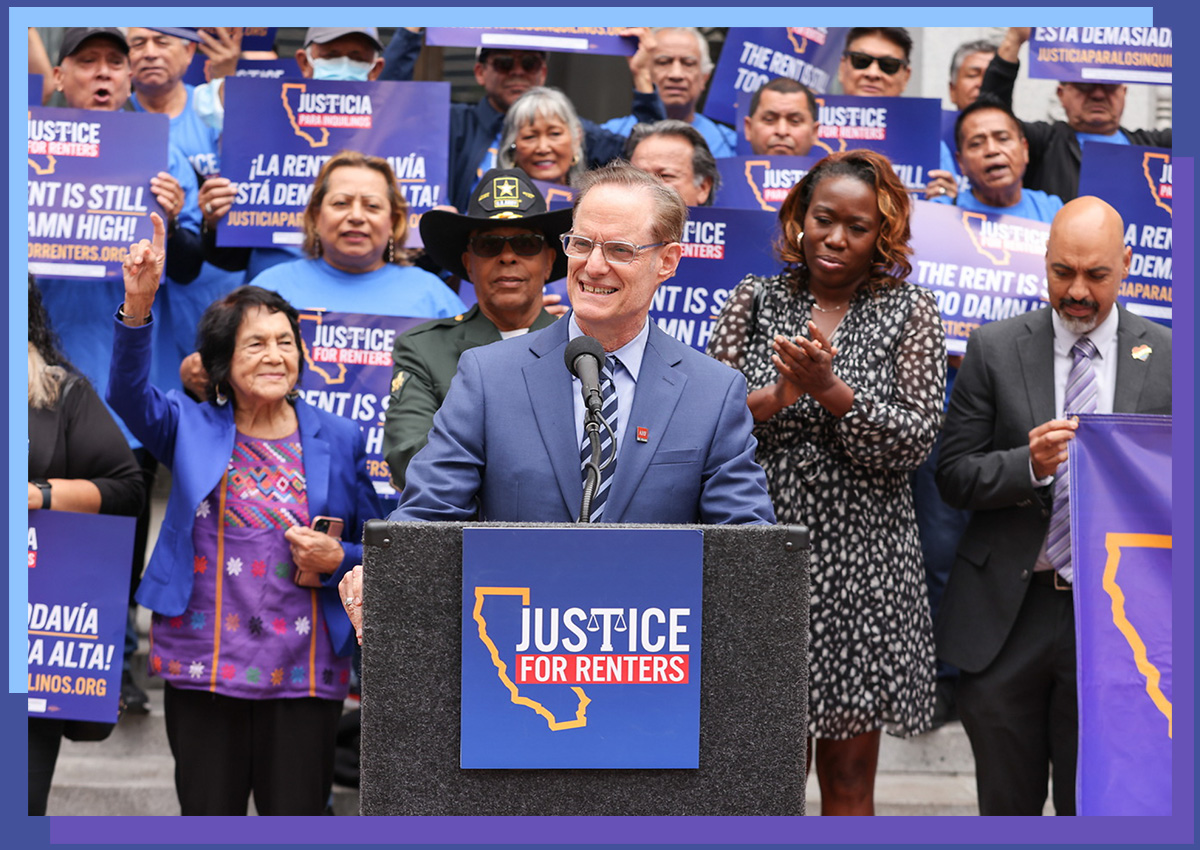A third attempt at overturning the statewide Costa-Hawkins Rental Housing Act will come before California voters in November. While tenant groups claim the additional regulations likely to result if Proposition 33 passes are critical to aiding in the state’s affordability and homelessness crises, opponents in the real estate industry say the “insidious” and “extreme” language of Proposition 33 will do the exact opposite.
“Their so-called solution would actually make our housing crisis worse at a moment when we need all the housing in California that we can get,” said Nathan Click, spokesperson for the No on 33 campaign, which has gathered nearly $50 million from the real estate industry to fight the measure.
Third-time charm?
This is the third time that tenant advocates have tried to overturn 1995’s Costa-Hawkins Act at the ballot box. Costa-Hawkins exempts single-family homes and rental units built after 1995 from local rent control laws, and disallows local vacancy control regulations, which means a rent-controlled unit is allowed to return to market rate on turnover.
The Tenant Protection Act of 2019 added a statewide rent cap at 5 percent plus the regional CPI or 10 percent, whichever is lower, but retained a carve-out for single-family homes and newer construction.
If Prop. 33 passes, local municipalities can add to those statewide restrictions. Tenant-friendly Bay Area jurisdictions like San Francisco, Berkeley and East Palo Alto would likely see additional legislation such as vacancy control on turnover and rent control on new construction.
Like the previous two attempts in 2018 and 2020, 2024’s Justice for Renters Act is sponsored by Michael Weinstein and his AIDS Healthcare Foundation, which has contributed $25.5 million of the $26.2 million raised to support the measure, according to state filings.
Susie Shannon, AHF’s point person for the measure, said in a previous interview with TRD last year that times have changed since the previous attempts failed.
“The state of California is a different place than it was four years ago,” Shannon said. “We’ve been through a pandemic. There are more adult children living with their parents because it’s harder to own a house. Rents are skyrocketing.”
Maria Zamudio, interim director of tenants rights group Housing Rights Committee of San Francisco, said lessons have been learned from the previous attempts on “how to sharpen the bill, what language gets kept or removed.”
“Extreme” arguments
The ballot language itself is brief: “The state may not limit the right of any city, county or city and county to maintain, enact or expand residential rent control.” As a result, it’s open to different opinions about its potential impacts.
Zamudio said that Prop. 33 is simply a “baseline regulation” that “gives locals a chance to do something about their housing crisis,” especially in areas on the Bay Area’s outskirts that don’t have a strong history of rental protections and have been growing due to the lack of affordability in the inner core.
But Click called the measure “extreme,” with no exemptions for new construction or single-family homes, and said it will lower property values and discourage investment in the state.
One of the “most insidious things” about the measure is that it could create an end-run around state requirements to build more housing by allowing local jurisdictions opposed to density to pass ludicrously high requirements for affordable housing, he said.
“What this measure would do is create a carve-out for any city, like Huntington Beach, to throw a wrench” in statewide efforts to encourage housing production, he said, referring to comments from a council meeting in the Orange County town reported by Politico. “‘We’re going to say that you can only charge a dollar rent on any affordable housing that’s built in Huntington Beach from today onwards,’ and that would be fully protected by this measure.”
Barry Altshuler, executive vice president at Equity Apartments, which owns and operates about 40 apartment complexes in the Bay Area, agreed with that assessment at a recent Marcus & Millichap-hosted webinar to discuss the possible ramifications of Prop. 33.
“If the state suddenly has no say in what cities can do, cities can literally weaponize laws to discourage housing in their communities,” he said.
In addition, Altshuler said that developers would stop building in the state if they can’t make a fair return on their investment.
“When expenses are rising faster than income, over some period of time it will become apparent that it’s just not an industry worth investing in anymore,” he said. “It is a loop of bad outcomes when the answer is increasing much-needed supply.”
Click said AHF’s goal is to stop new housing production, adding that pro-housing civic leaders like East Bay Assemblymember Buffy Wicks have “come off the sidelines” and been vocally opposed this time around because the damage to housing development would be so great.
“Make no mistake about it, this ballot measure will end housing production in California full stop,” Wicks said in a statement. “We will not end the housing crisis unless we build millions of new homes at all levels of affordability. We’ve passed critical new laws to streamline housing construction, protect tenants and give working families access to affordable, transit-friendly homes, all of which will be in jeopardy if this ballot measure passes.”
Zamudio of HRC-SF said that these arguments are “scare tactics” and that the state already has plenty of empty market-rate housing that’s simply priced too high for most people to access. Citing data collected when San Francisco voters passed a residential vacancy tax measure in 2022, she said there are more than 60,000 vacant units in the city alone. Further analysis from the city’s chief economist showed that only about 7,000 were long-term vacancies of more than six months.
Housing construction is not impacted by rent control, she argued, but rather the ups and downs of the real estate market, insurance, inflation and “how much tenants can and cannot pay for new construction.”
The state’s nonpartisan Legislative Analyst’s Office said renters will likely need to move less often and those covered by rent control will pay lower rent if the legislation passes. At the same time, it predicted rents for those not under rent control would go up, fewer homes will be available for rent, and the state will see a reduction in local property tax revenues of at least tens of millions of dollars annually.
Talking to tenants
In a state that is 44 percent renters, it will likely be the tenants themselves who decide the measure’s fate.
A UC Berkeley IGS poll from early August shows that 40 percent of likely voters are in favor of the measure, 34 percent are opposed and 26 percent are undecided, so there are still many votes up for grabs before election day.
AHF just started running its first television ads, set to the tune of The Mamas and the Papas’ “California Dreamin’” but with the lyrics changed to “California’s Leavin’” with images of people packing up to leave the state.
As a 501(c)3, HRC-SF is not allowed to campaign for the measure, Zamudio said. But if tenants ask what staffers think about the legislation, they are allowed to respond as individuals, not as the organization as a whole, that they support it and why.
The No on 33 campaign hasn’t spent much of its nearly $50 million war chest yet, with $19 million coming from the California Association of Realtors and $17.5 from the California Apartment Association, according to state filings. But that will start to change as election day draws closer, Click said.
Some of those efforts will focus on going straight to renters with a message about how Prop. 33 could “hurt our housing system writ large,” he said, through both lack of new construction and reducing the quality of existing housing stock because owners won’t have the funds for maintenance.
CAA CEO Tom Bannon said at the Marcus & Millichap webinar that the organization is coming up with talking points for owners and property managers to discuss with tenants who want to know how Prop. 33 could affect them.
He added that 28 percent of the state’s rental stock is single-family rentals, and that single-family owners might decide to take their homes off the rental market if they are not exempt from rent control, an argument that could resonate with renters.
CAA has also put nearly $27 million behind a separate ballot measure designed to curb Weinstein’s influence on future elections. Prop. 34 says that health care providers who utilize government programs to access discounted medications for their low-income populations; spend $100 million on expenses other than direct care; own and operate apartment buildings; and have received at least 500 severe health and safety violations in the last decade — a list of criteria that only seems to apply to AHF — must spend at least 98 percent of their drug sale revenue on patient care or risk having their state license and tax exempt status revoked.
The measure appears to be an acknowledgement that, even if Prop. 33 fails this time around, it is likely to pop up again on another ballot in the not-too-distant future.
Zamudio noted that it took property owners many years to get Costa-Hawkins passed, so she’s not surprised that it has taken several attempts to have it repealed. She said that tenant rights groups will not give up if it is defeated once again in November.
“It takes a while to change things,” she said.
Read more



